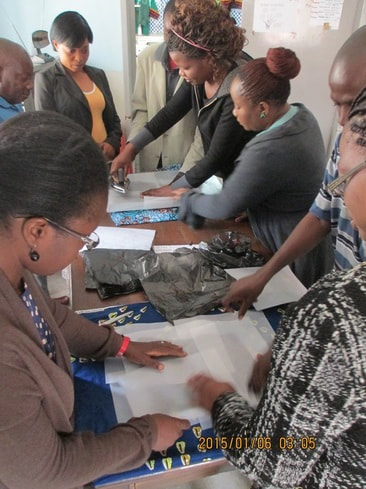More than 250 people were trained over10-days. In addition to local residents POL staff and staff members from other NGO’s were also trained so that they could become trainers themselves and, as a result, increase the impact of the project exponentially. The main skills taught during the trainings were how to make the base material that can then be transformed into the different products and how to make a bag. According to Doane Nets project founder, Dr. Brad Elder, “once people learn how to do this, they can easily expand into other ideas.” Under DOL’s tutelage plastic became mosquito netting for windows and doors, permanent bags, hats, raincoats, backpacks, hammocks, bed mats, decorative flowers and more. Other skills included rope making (for belts, rope, swings, and rugs) and the making of plastic yarn, “plarn,” a big hit among older women who could no longer crochet due to the cost of yarn.
“This is by far the most successful project I have worked on in the six countries I have traveled through in Africa, ” Elder says. “That was all due to the support of the POL staff. Usually I show up in a town for a few days and teach at the local market or a school. There is no follow up and never time to answer questions so that people may learn more...The POL staff was able not only to get all the material asked for ahead of time, but also planned on the need to get all late minute supplies and to fix/overcome obstacles.” Based on the success of the pilot project, plans are underway to launch supplemental phases of the project. POL will work with participants to improve their projects and think about reaching markets. Another key goal will be to help shift the focus from bags and other products that are more readily marketable to mosquito nets and screens. “The nets will take longer,” says Elder, “but the POL staff has a better chance with this group of ladies than I have ever had with any group I have worked with in the past.”
0 Comments
Leave a Reply. |
Archives
July 2021
Categories |
- Home
-
Grants
- Current Grantees >
-
Past Grantees & Projects
>
- Anguilla Heritage Assessment Project
- The Bail Project
- Barefoot Artists
- Center for Justice Reform
- Highland Greens
- Kantora Action for Green
- Maher Ashram
- Make Every Woman Count
- New Voices for Reproductive Justice
- Power of Love
- Power Shift Network
- Roberto's Kids
- Steps to End Domestic Violence
- Vermonters for Criminal Justice Reform
- The WASH Foundation
- The Zambia Net-Works Project
- VoteWise
- Urgent Response Fund
- Projects
- Equity Funds
- Annual Reports
- Giving
- Our Team
- Events
PENNYWISE FOUNDATION
P.O. Box 1112 Richmond, VT 05477
Phone: (802) 318-5450
Phone: (802) 318-5450
© The Pennywise Foundation. All rights reserved.


 RSS Feed
RSS Feed